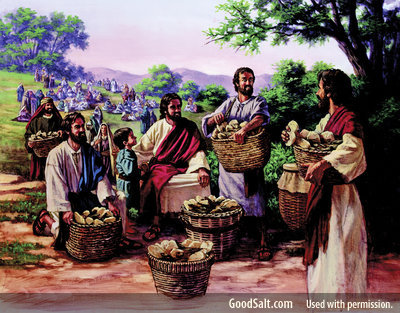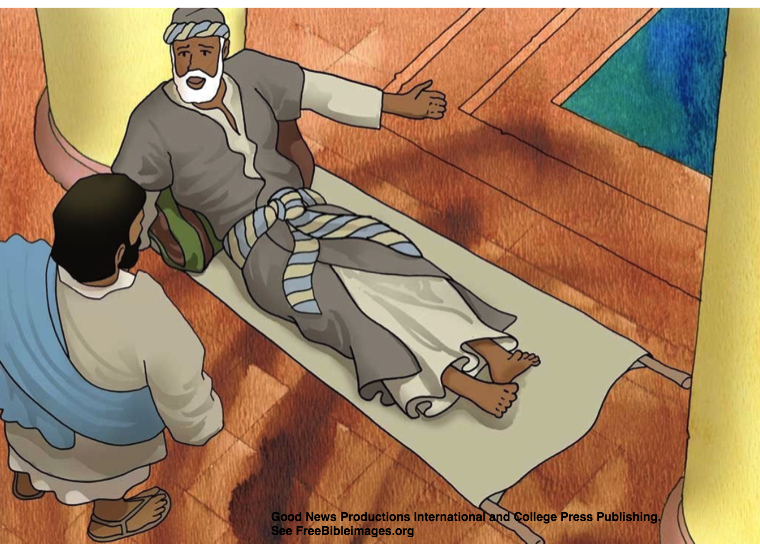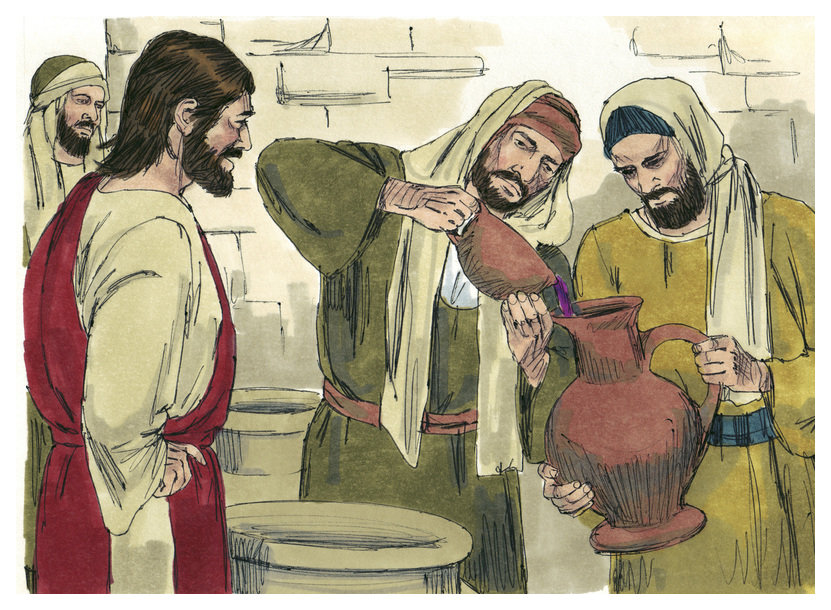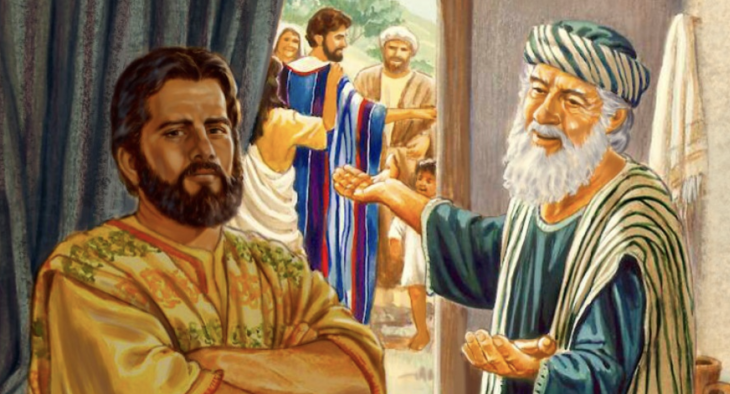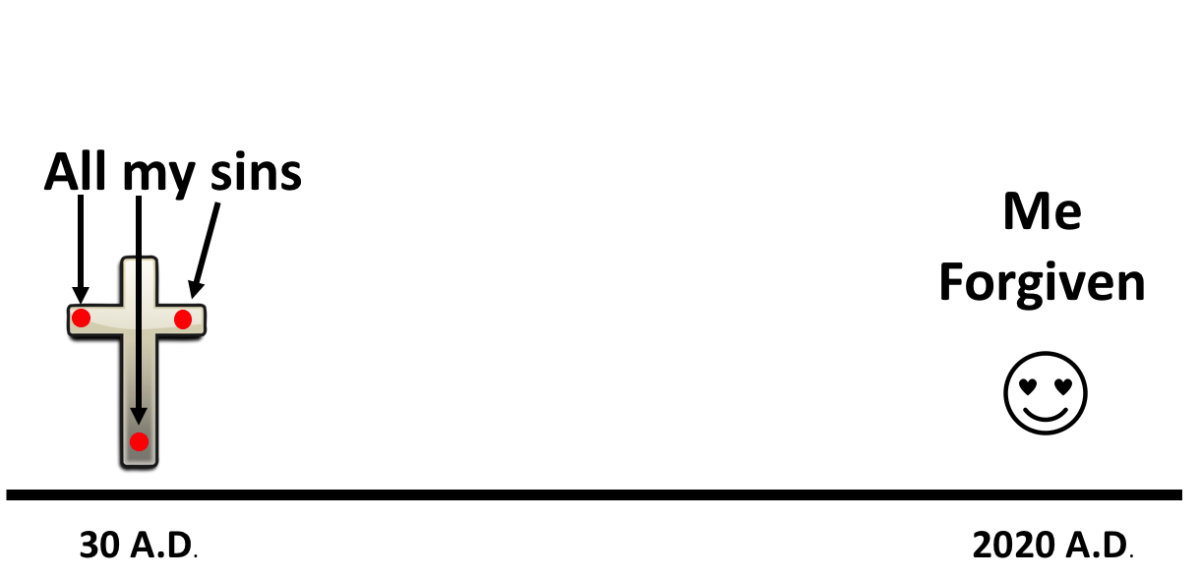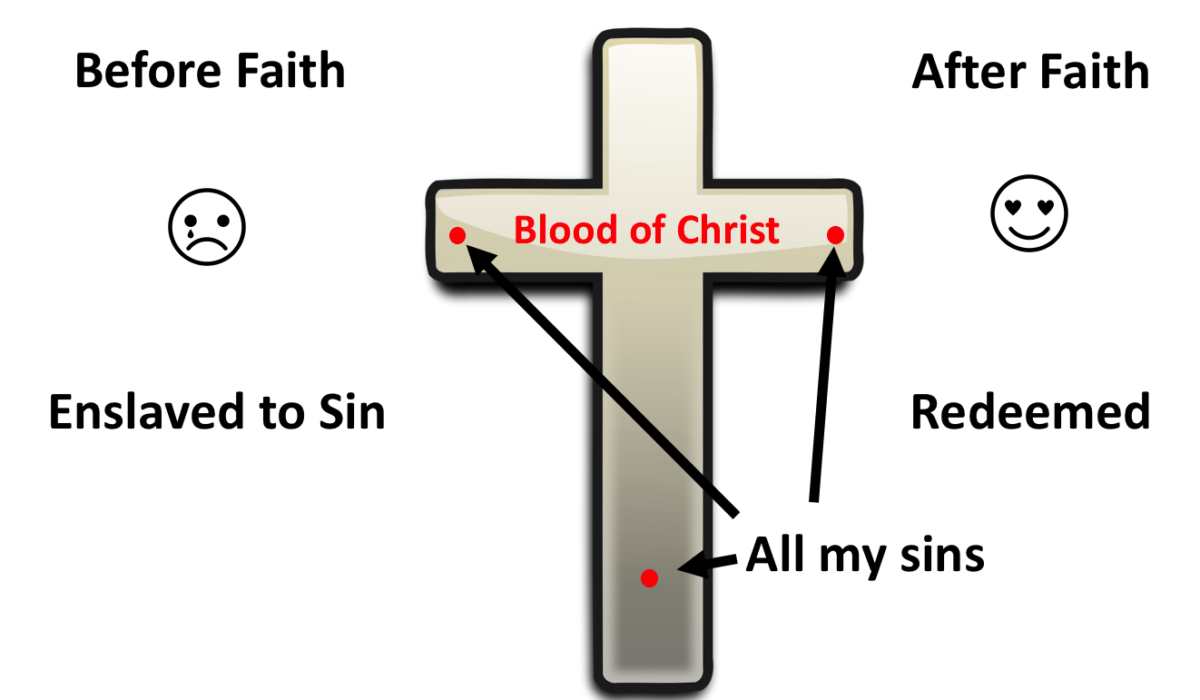“And Jesus said to them, ‘I am the bread of life. He who comes to Me shall never hunger, and he who believes in Me shall never thirst.’ ” John 6:35
The third and final way to reach a materialistic person is to CHALLENGE THEM TO TRUST THE SAVIOR (John 6:35-40). Jesus tells the crowd how to do this using two simple things everyone understands: hunger and thirst. “And Jesus said to them, ‘I am the bread of life. He who comes to Me shall never hunger, and he who believes in Me shall never thirst.’ ” (John 6:35). The materialist hungers and thirsts for power… possessions… and popularity! But the greatest hunger and thirst of all is for immortality. Jesus says to look to Him to satisfy our hunger for immortality. Look to Him to quench our thirst for eternal life. What do you do when you are hungry? You eat. What do you do when you are thirsty? You drink. Jesus says that if we come to Him in faith, we will never hunger for eternal life again. If we believe in Him we will never thirst for eternal life again. One bite of the bread that Jesus’ offers an one drink of the water that Jesus offers, satisfies our spiritual hunger and thirst forever.
What if a person stops believing in Christ? Will he hunger or thirst for eternal life again? No. Because the spiritual need which Jesus meets can never reoccur. Once you receive eternal life, you have it forever. After all, how long is “never”? It is forever, right? If a person could hunger or thirst for eternal life again after believing in Jesus, then Christ just told a lie. Jesus says one bite… one drink satisfies for eternity. The results of believing in Christ are permanent even if we don’t keep on believing.
Jesus said, “But I said to you that you have seen Me and yet do not believe.” (John 6:36).Not all who see will come to Christ. Although they had seen His miraculous power and had heard His claims, this crowd still refused to believe in Jesus alone for eternal life. They were not convinced He could give them eternal life simply by believing in Him. This is hard for the materialist. He has always provided for his own needs, and now he is being challenged to trust someone outside of himself for his most important need.
“All that the Father gives Me will come to Me.” (John 6:37a). The reason these materialists wouldn’t believe in Christ was because the Father had not given them to Jesus. No matter how much we have prayed and planned… no matter how persuasive we are in sharing the gospel… people will not come to Christ unless the Father has given them to His Son. Does this mean that no one can get saved if the Father has not given them to Jesus? Some Calvinists refer to this verse as proof of unconditional election.
But I believe there is a better explanation. Anthony Badger astutely observes that Jesus spoke the words of John 6:37-39 just before speaking of building His church in Matthew 16:18. Because of Israel’s final rejection of Christ (Matthew 12:22ff), Jesus “anticipated an end of the Dispensation of the Law and a transfer into the Dispensation of Grace… Jesus spoke the words of John 6:37-39 at the time of His final rejection by the nation. He certainly knew that Israel was to be judged for their rejection and that the Church age intercalation was at hand. Israel would be temporarily set aside, and the Church would become God’s select, corporate instrument for His service during the Dispensation of His Grace. And it will continue to be so until its translation/rapture prior to the coming Tribulation period (the 70th week of years spoken of in Daniel 9:24-27. At that time God will resume His plan for national Israel). Prior to this transfer of believers from Father to Son in anticipation of the new age, they belonged to the Father by faith. The transfer (the Father giving believers to the Son) merely acknowledged the reality of the coming Church Age.”
“This fits contextually as well. When Jesus began to set His face toward Jerusalem (Mt 16:21) it was evident that a new day was coming. No longer could the old ways be continued. New, fresh, rejuvenating wine cannot be stored in old, outdated, dry, cracked wineskins. A transfer of ownership of Old Testament believers to Christ was necessary. God the Father putting all things into the hands of His Son. This is further supported in Jesus’ discourse with the disciples in John 14-16. Believing Jews who belonged to the Father, having only the promise of the Messiah, were at this point delivered over into the Son’s hands for keeping. Now they belonged to the Messiah. The lack of dispensational understanding of Calvin, the Reformers, and Reformed Theology allows them to misunderstand John 6:37-39.” (Anthony B. Badger, Confronting Calvinism: A Free Grace Refutation and Biblical Resolution of Radical Reformed Soteriology [Anthony Badger, 2013], pp. 185-186).
Jesus than said, “And the one who comes to Me I will by no means cast out.” (John 6:37b). The phrase “I will by no means cast out” is emphatic in the Greek language (οὐ μὴ ἐκβάλω ἔξω). Literally it means, “I will no not ever cast out” the one who comes to Me. No matter… what your record or what you have done… where you have been or how proud, arrogant and self-sufficient you have been, when you come to Christ you will be welcomed by Him. You will not be cast out. Jesus will never reject you no matter what you do after you come to Him. This is God’s amazing grace. It cannot be earned and it cannot be undone. Once you come to Christ in simple faith, you are God’s child forever.
Some of us come from backgrounds which are filled with rejection. The main reason some of us have a hard time trusting people today is because we have experienced so much rejection while growing up. Perhaps a parent criticized us for everything we did… a teacher humiliated us… a friend betrayed us… a spouse left us… an employer terminated us. Jesus guarantees you will never be rejected by Him. His love and acceptance of you is unconditional. The materialist needs to know this because he has grown up trying to buy or earn people’s love. But now he is challenged to believe in Someone who loves and accepts him regardless.
“For I have come down from heaven, not to do My own will, but the will of Him who sent Me.” (John 6:38). And what is the will of the Father who sent Jesus? “This is the will of the Father who sent Me, that of all He has given Me I should lose nothing, but should raise it up at the last day.” (John 6:39). Is staying saved a matter of a Christian doing the Father’s will or of Jesus doing His Father’s will? Jesus doing His Father’s will. If Jesus lost one person who believed in Him, then He would have failed to do the will of His Father. And that presents a moral dilemma. For if Jesus failed to do His Father’s will, then He would have sinned and could no longer be God.
But listen to me. Jesus Christ has never lost one believer and He never will because He is God (John 1:1; Titus 2:13) and He always does the will of His Father. This is the ULTIMATE SECURITY. Something every materialist (and every person) needs. The materialist lives in fear of losing his possessions, power, and popularity. But when he comes to Jesus he is safe forever. We need to get a grip on this. Too many believers are being taught that you cannot know for sure you are going to heaven because they are taught that it is based on your performance instead of Christ’s. This contradicts what Jesus is saying here. Assurance of your salvation is not based on you doing God’s will, but on Jesus doing the Father’s will.
Jesus concludes, “And this is the will of Him who sent Me, that everyone who sees the Son and believes in Him may have everlasting life; and I will raise him up at the last day.” (John 6:40). Does the word “everyone” mean everyone? Does Jesus include all the homosexuals, drunkards, drug addicts, liars, psychics, terrorists, the wealthy, and the most moral people who see the Son of God and believe in Him? Absolutely! God’s gift is for everyone who will receive it by faith.
Has your thirst for immortality been quenched? Do you know for sure that you have eternal life? If not, why not take Jesus Christ at His word right now? Place your trust solely in Him to save you. Give up confidence in anything else: your prayers, giving, church attendance, baptism, obedience, commitment, or the reformation of your life, etc. Jesus Christ guarantees eternal life to all who trust in Him as their Savior.
Let us share this message gladly and often. It is glorious news! It is the greatest news! Don’t worry so much about method. Concentrate on the message. Tell people eternal life is a free gift and that the sole condition for receiving it is believing or trusting in Christ alone. Leave the results to God. After all, eternal life is the gift of God. He is the One giving the gift.
Prayer: Father God, thank You for this incredible free gift that lasts forever! Please give me a love for the materialistic people in my life. I need Your Holy Spirit to help me to confront their selfish desires, to correct their misconceptions about salvation, and to challenge them to trust the Savior for eternal life so that they can discover the joy of everlasting security in Jesus Christ. Security that cannot be lost or taken away. Lord, I pray that those of us who know You will seek satisfaction in our relationship with You and not the things of this world. Enable us to live in light of eternity. In Jesus’s name. Amen.

